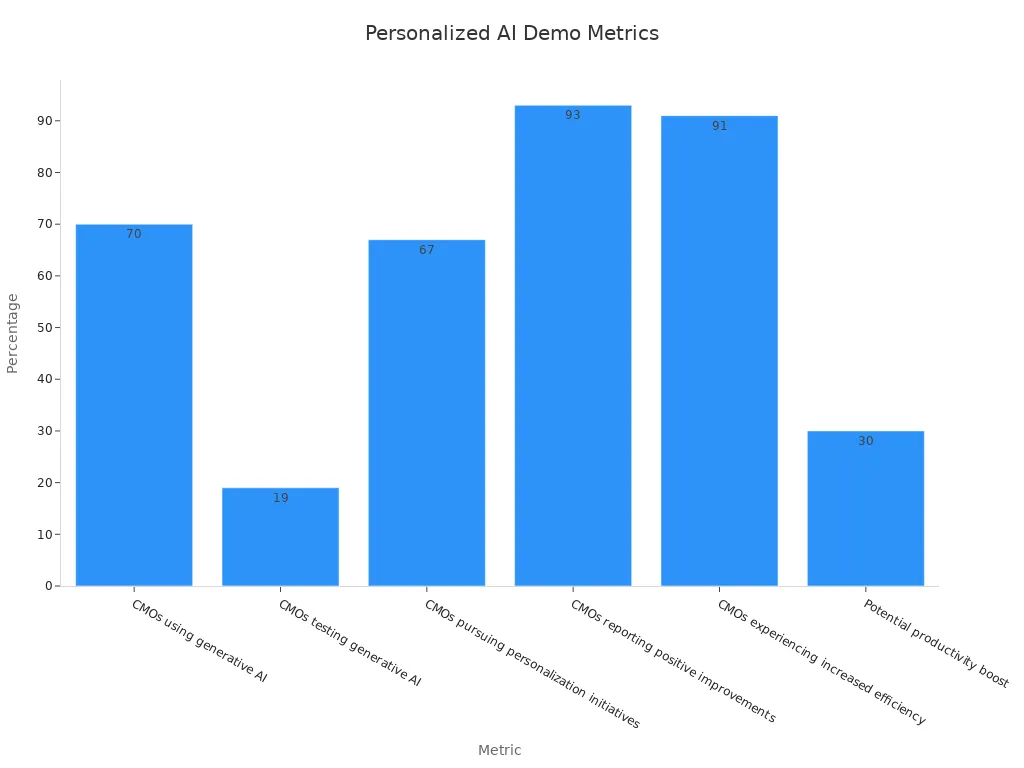Using AI to Write Content for Sales Demos

Imagine making sales demos that fit each client perfectly by using AI. You won’t need hours to create them. Using AI helps you do this easily. It solves problems like tight deadlines, boring messages, and uneven quality. Did you know 87% of people use AI more after trying it? Also, over 60% of business owners say using AI helps them work faster. With AI, you can make content that is personal and exciting every time.
Key Takeaways
AI helps save time by doing boring tasks automatically. This lets sales teams spend more time with customers and closing deals.
Making things personal is important. AI creates special content for each client, making demos more interesting and useful.
Keeping the same tone and quality builds trust. AI makes sure your demos match your brand's style every time.
AI lowers costs by doing tasks automatically and helping teams work better. This helps businesses do more with less work.
Improving is important. Test and update your AI-made content often to keep it helpful and up-to-date.
Why Using AI is a Game-Changer for Sales Demo Content

Enhancing Efficiency and Saving Time
Time is super important when making sales demos. AI helps save time by doing repetitive tasks for you. For example, it can study buyer data, write custom scripts, and suggest images for your presentation. This lets you focus on connecting with people and closing deals.
Did you know salespeople save about 2 hours and 15 minutes daily using AI? That’s extra time to build relationships or improve your pitch. AI tools also find the best leads with predictive analytics, so you don’t waste time on bad prospects.
Statistic | Description |
|---|---|
78% | Salespeople say AI helps them save time. |
2 hours 15 minutes | Time saved daily with AI automation. |
Personalizing Content at Scale
Making your sales demos personal is very important. But how can you do this for hundreds of clients? AI makes it easy. It helps you create unique content for different groups without much effort.
For example, generative AI lets small companies compete with big ones by making lots of personalized content. Did you know 70% of CMOs already use generative AI? Also, 93% say it improves their personalization. This technology gives all businesses the tools to make amazing, custom demos.

Ensuring Consistency and Quality
Being consistent helps build trust with your audience. If your demos are all different, it might confuse clients. AI keeps your content consistent in tone, style, and quality.
AI tools can learn your brand voice and use it in all your sales materials. This way, every demo matches your company’s message. A biotech company used AI to study buyer data and got 25% more engagement in their demos. That’s how powerful consistent, high-quality content can be.
Tip: Consistency doesn’t mean boring. Use AI to keep your brand voice while adding fun, creative ideas to your demos.
Reducing Costs for Teams of All Sizes
AI doesn’t just save time—it also helps save money. Whether you’re in a small business or a big company, AI helps you do more with less effort. By automating tasks like entering data or sending follow-up emails, you can cut costs without losing quality. This lets your team focus on what’s important—building connections and closing sales.
Here’s how AI saves money:
It uses customer data to make custom solutions, avoiding waste on general plans.
It handles simple tasks, so you need fewer extra workers.
It makes employees more productive by freeing them from boring jobs.
Think about it—when your team spends less time on small tasks, they can work on bigger goals that grow your business. For example, instead of studying customer habits by hand, AI tools can do it fast. This saves money and helps your team work smarter, not harder.
Tip: Start small. Try AI tools on one or two tasks first. Once you see the benefits, you can use them for more jobs.
AI brings smart tools to businesses of all sizes. You don’t need a huge budget to use it. With the right tools, you can simplify your work, avoid waste, and get more done—all while keeping costs low.
Step-by-Step Guide to Using AI for Sales Demo Content
Setting Goals and Knowing Your Audience
Before making your sales demo, set clear goals. What is your purpose? Do you want to teach, show a product, or close a sale? Clear goals keep you focused and match your demo with your business plan.
Set goals you can measure. For example, aim to boost demo views by 20% or shorten the sales process by a few days. These goals guide your work and help track progress.
Knowing your audience is just as key. Who are they? What problems do they have? AI tools can study customer data to find out what they like, need, or struggle with. By solving their problems in your demo, you’ll make it more interesting and useful.
Tip: Use AI to record and write out sales calls. This can show common questions and help improve your demos.
Picking the Best AI Tools for Your Needs
Not all AI tools are the same. Choosing the right ones is important. First, figure out what you need. Do you need help writing, making visuals, or studying customer data? Once you know, look for tools that fit those needs.
Some AI tools are great for writing emails, while others are better for creating sales scripts or pricing plans. Pick tools that work well with your current systems and are easy to use.
Here’s a simple checklist:
Does the tool match your demo goals?
Can it handle the amount of content you need?
Does it give reports to check performance?
Is it affordable for your budget?
Note: Many AI tools let you try them for free. Test a few to find the best one for your team.
Making Content: Scripts, Visuals, and Messages
After setting goals and picking tools, start creating. AI can help write scripts, design visuals, and craft messages that connect with your audience. For example, AI can use customer data to write scripts that solve specific problems. This saves time and makes your demo better.
Visuals are also important. AI can suggest pictures, charts, or graphics to improve your presentation. For instance, you can use AI to make a chart showing how your product is better than others. These visuals make hard ideas easier to understand.
Messages are where AI really helps. By studying customer actions, AI can create messages that fit their needs. Did you know that generic messages can lose customer trust by 62%? Personalized messages build trust and lead to more sales.
Content Type | How AI Helps | Impact on Sales Demos |
|---|---|---|
Scripts | Writes custom, data-based scripts | Saves time and boosts engagement |
Visuals | Recommends useful images and graphics | Makes demos clearer and more exciting |
Messaging | Creates messages based on customer behavior | Builds trust and increases conversions |
Tip: Don’t depend only on AI. Check and adjust the content to match your brand and connect with your audience.
Refining AI-Generated Content for Maximum Impact
AI makes great content, but you improve it. Refining AI content helps your demos connect better with people. Think of AI as a helper—it starts the work, but you finish it. Here’s how to make AI content even better.
Focus on What Matters Most to Your Audience
AI can study customer data and suggest ideas, but you know your audience best. Look at the AI content and ask: Does it solve their problems? Does it show what they care about most?
For example, if your product saves time, highlight that in your demo. Change the script and visuals to match their daily needs. When people feel understood, they’ll pay more attention to your demo.
Add a Human Touch to Build Trust
AI can write and design, but it can’t replace human warmth. Adding personal touches makes your content feel real. Use friendly words, tell stories, or share examples.
For instance, instead of saying, “Our product boosts efficiency,” say, “Imagine finishing work faster—our tool makes it happen.” This helps people picture using your product and builds trust.
Tip: Read AI scripts out loud and adjust them. A little personality makes your demo stand out.
Test and Optimize for Better Results
Improving content doesn’t stop after one try. Test different demo versions to see what works best. Change the tone, visuals, or key points to find the best mix.
AI tools can track how your demo performs. Check which parts people like most. If viewers lose interest in one section, fix it to keep them watching.
Description | |
|---|---|
Enhanced Customer Engagement | AI creates tailored experiences, making content more relevant. |
Improved Conversion Rates | Focused demos connect better, leading to more sales. |
Accelerated Sales Cycles | Personalized demos help faster decisions, shortening sales time. |
Keep Your Brand Voice Consistent
Your brand voice makes your business special. AI can copy your tone, but you must check for consistency. Review content to ensure it matches your style and values.
For example, if your brand is fun, avoid formal language. If it’s professional, keep the tone clear and polished. Consistency builds trust and helps people recognize your brand.
Note: Save your brand rules in your AI tool. This helps it create content that fits your style.
Simplify Complex Ideas with Visuals
Sometimes, words aren’t enough to explain things. AI can suggest visuals like charts or graphs to make ideas clearer. Use these to simplify hard concepts.
For example, if your product saves money, show a bar chart comparing costs. Visuals grab attention and help people remember important details.
Tip: Don’t use too many visuals. Pick a few that support your main ideas.
By improving AI content, you can make demos that are polished and effective. Focus on your audience, add personal touches, and test for better results. This will make your demos stand out and succeed.
Best Practices for Using AI in Sales Demo Content
Balancing AI Efficiency with Human Authenticity
AI can do tasks fast, like making scripts or analyzing data. But adding a human touch makes your demos special and memorable. Mixing AI’s speed with human warmth helps build trust and connect with your audience.
Here’s how to balance both:
Let AI handle boring tasks, so you can focus on storytelling.
Use AI for quick answers, but let customers talk to a person for deeper help.
Combine AI’s personalization with real human interactions for a perfect mix.
By 2025, brands will focus more on trust and being real. Customers care about quality, not just lots of content. Make demos that matter to them instead of using generic ideas. For example, AI can show product features, but you can add a story to make it relatable.
Tip: Think of AI as a helper, not a replacement. Use it to improve your work while keeping the human connection strong.
Did you know 34% of customers think AI made their experience better? But when AI and humans work together, engagement and sales improve even more. Together, they create demos that are both smart and heartfelt.
Customizing Content for Different Audience Segments
Not all audiences are the same, so your demos shouldn’t be either. Customizing content for different groups makes your message more meaningful. AI helps by studying data and creating content for specific people.
Here’s how AI can help you segment your audience:
Make profiles based on age, interests, or spending habits.
Write messages for groups like young workers, tech lovers, or health fans.
Focus on key groups to save money and get better results.
For example, young workers might like demos about saving money and career growth. Older professionals may prefer content about premium features and ease of use. AI finds these preferences and helps you create the right message for each group.
Note: Personalization isn’t just using someone’s name. It’s about showing how your product fits their life and solves their problems.
By tailoring demos to different groups, you’ll connect better and build stronger relationships. Personalized demos make people feel important, leading to loyalty and trust.
Aligning Content with Brand Voice and Messaging
Your brand voice makes you unique. It’s how people recognize and connect with your business. When using AI for demos, make sure the content matches your brand’s tone and message.
Here’s how to stay consistent:
Decide your brand voice—friendly, professional, or fun?
Save your brand rules in AI tools to match your style.
Check AI-made content to ensure it fits your tone and values.
For example, if your brand is fun and casual, avoid formal language. If it’s high-end, keep the tone polished and classy. AI can copy your style, but you need to adjust it to feel real.
Tip: Consistency builds trust. When your demos have the same tone and message, people feel confident in your brand.
Visuals also matter for your brand identity. AI can suggest charts or images, but make sure they match your brand’s look. A clear and cohesive design makes your message stronger and more memorable.
By keeping your content aligned with your brand voice, you’ll create demos that inspire and inform. Your audience will remember your message and connect it with your unique identity.
Testing and Iterating for Continuous Improvement
Creating great sales demo content doesn’t stop after the first draft. To truly stand out, you need to test, tweak, and improve continuously. This process ensures your demos stay relevant, engaging, and effective. Let’s explore how you can use testing and iteration to refine your AI-generated content.
Experiment with A/B Testing
A/B testing is one of the best ways to figure out what works and what doesn’t. It’s like running a mini-experiment. You create two versions of your demo content, change one element (like the headline or call-to-action), and see which one performs better.
Here’s why A/B testing is so powerful:
It helps you understand what your audience prefers by testing different designs, messages, or visuals.
You can try out new strategies to see what grabs attention and keeps people engaged.
The results are based on real data, so you can make decisions backed by evidence.
For example, if you’re unsure whether a formal or casual tone works better, test both. Let the data guide you. Over time, these small experiments lead to big improvements in your content.
Tip: Start with one change at a time. Testing too many things at once can make it hard to know what’s working.
Measure Success with Key Metrics
Testing is only useful if you know what to measure. Tracking the right metrics helps you see how well your demos are performing and where they need improvement.
Here are three key metrics to focus on:
Conversion Rates: How many leads turn into paying customers? This shows how persuasive your demo is.
Sales Cycle Length: How quickly do deals close after a demo? Shorter cycles mean your content is clear and convincing.
Win Rates: What percentage of opportunities turn into successful sales? A higher win rate means your demo is hitting the mark.
You can also compare AI-generated demos to those created by human agents. Look at metrics like customer retention or cost efficiency. If AI is saving money while maintaining quality, you’re on the right track.
Use Feedback to Improve
Feedback is a goldmine for improvement. Ask your team, clients, or even prospects what they think about your demos. What did they like? What confused them? Use their insights to make your content better.
AI tools can also help by analyzing viewer behavior. For instance, if people stop watching your demo halfway through, it’s a sign that part of the content needs work. Adjust and test again until you get it right.
Note: Don’t take feedback personally. Every comment is a chance to make your demos stronger.
Keep Iterating for Long-Term Success
Improvement isn’t a one-time thing. It’s an ongoing process. Regularly review your demos, test new ideas, and update your content to match changing customer needs.
Here’s a simple plan to keep iterating:
Test one element of your demo each month, like visuals or messaging.
Track performance metrics to see what’s working.
Use the results to make small, meaningful changes.
Over time, these small tweaks add up. Your demos will become more polished, engaging, and effective.
Tip: Think of your demos as a living project. They should grow and evolve with your business.
The Power of Continuous Improvement
When you combine testing, feedback, and iteration, you create a cycle of continuous improvement. This approach ensures your sales demos stay fresh and impactful. By focusing on what works and fixing what doesn’t, you’ll build content that resonates with your audience and drives results.
So, don’t settle for “good enough.” Keep testing, learning, and improving. Your audience—and your bottom line—will thank you.
Inspiring Examples of AI-Generated Sales Demo Content

Case Study: AI-Generated Product Demo Script
Think about making a product demo but having no time to write the script. AI can help by doing the hard work for you. For example, a software company used AI to create a demo script just for their audience. The AI studied customer data, found their problems, and made a script that solved them.
The outcome? A demo that felt personal and interesting. The sales team saw customer engagement go up by 30% during presentations. By using AI, they saved time and made a script that connected with their audience. This shows how AI can turn a regular demo into a strong sales tool.
Tip: Always check AI-made scripts to match your brand’s tone and message.
Example: Personalized Sales Pitches Created with AI
Personalized sales pitches are key to closing deals. AI helps make pitches that speak directly to each customer. For instance, AI tools can study customer actions and create messages that solve their specific problems.
Here’s how to measure these pitches’ success:
Ask clients for feedback to improve your pitches.
Use analytics to see what works and what doesn’t.
One company used AI to make pitches for different customer groups. They saw a 40% rise in response rates and more conversions. By focusing on what each client needs, they turned AI-made pitches into a winning strategy.
Success Stories from Businesses Leveraging AI
Companies in many industries are seeing great results with AI in sales demos. For example, Zoho CRM Plus used AI to improve customer interactions. Their AI insights boosted customer satisfaction and made support easier.
Company | AI Application | Measurable Outcome | Description |
|---|---|---|---|
Zoho CRM Plus | Customer Interaction | Better customer satisfaction with AI-driven insights and actions. | The demo shows a platform that improves customer interactions and makes support simpler. |
These examples show that AI isn’t just a tool—it’s a way to get real results. Whether your business is small or big, AI can help you make demos that work.
Using AI changes how you make sales demo content. It helps you create fun, personal, and easy-to-share materials. Plus, it saves time and effort. By using the tips shared here, you can get the most out of AI and see real improvements.
Metric Type | What It Measures |
|---|---|
Workflow speed and quality | Tracks how fast and well content moves through steps, like approvals and edits. |
Fewer mistakes | Checks how AI reduces errors by comparing mistakes before and after using it. |
Better use of resources | Looks at time spent on tasks and how it improves results, helping teams work smarter. |
Compares the value of AI-made content to the money saved by automating tasks. |
Try AI tools now. They’ll make your sales demos better and more successful.
FAQ
What types of AI tools work best for sales demo content?
Tools like ChatGPT or Jasper AI are great for writing. For visuals, try Canva or Visme. To study customer data, use HubSpot or Salesforce Einstein. Pick tools that match your needs and goals.
Can AI replace human creativity in sales demos?
No, it can’t. AI helps with tasks and gives ideas, but it doesn’t have feelings or storytelling skills. Use AI to support your creativity, not replace it. Add personal touches to make your demos feel real and relatable.
How do I make sure AI content fits my brand voice?
Save your brand rules in the AI tool. Check the content it makes and tweak the tone, style, and words to match your brand. Keep refining the AI’s work to stay consistent and true to your brand.
Is AI too costly for small businesses?
Not always. Many AI tools have free trials or low-cost plans. Start with simple tools for tasks like writing or studying data. Once you see results, you can upgrade to better features.
How can I check if AI-made sales demos are successful?
Look at metrics like engagement, conversions, and sales time. Use AI tools to study viewer actions and find areas to improve. Test and adjust your demos based on these insights to make them better over time.
Tip: Focus on one metric first to keep things simple.
See Also
Content Creation Showdown: Writesonic AI Meets QuickCreator
Transforming Blogging: The Impact of AI Blog Builders
Comprehensive AI Blog Builders: Writing, Hosting, and SEO

